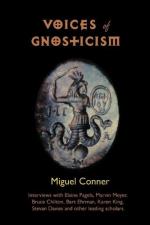|
This section contains 4,980 words (approx. 17 pages at 300 words per page) |

|
The problem of the origin of Gnosticism has been approached in Western culture with methods and results that are sometimes in clear disagreement. Perhaps the first to deal with the subject critically was Gottfried Arnold, who wrote in 1699 the Unparteiische Kirchen und Ketzer Historie (Impartial History of the Church and of Heresy)—a work that influenced the poetry of Goethe in a Gnostic sense—although the subject was previously mentioned in by G. P. Marcossius's De Vitis Secretis et Dogmatibus omnium Haereticorum, printed in Cologne in 1569.
However, it was only with Johann Lorenz von Mosheim (1694–1755) that the study of Gnosticism came to the fore as an independent discipline. In his degree thesis entitled "Institutiones christianae maiores" (Helmstadt, 1739) the future Protestant pastor and theologian described gnōsis as an Eastern philosophy that had rapidly expanded of its own accord from Greece and Chaldea (=Mesopotamia), and...
|
This section contains 4,980 words (approx. 17 pages at 300 words per page) |

|



